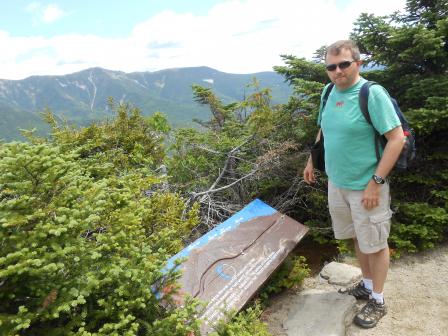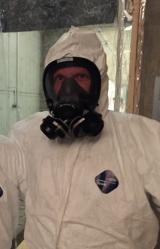Meet EPA Physical Scientist Lukas Oudejans
Lukas Oudejans, Ph.D. is a physical scientist working in EPA’s Center for Environmental Solutions and Emergency Response. His research focuses on preparing cleanup options for the agency following a disaster incident.
Tell us about your background.
 Meet EPA Physical Scientist Lukas Oudejans!I started my education in the Netherlands, where I was born and raised. I received a Ph.D. in experimental physics. I moved to the U.S. after obtaining a post-doc position with the University of North Carolina in 1994. That eventually led to a post-doc position with EPA in 2000, where I conducted research with the Air Pollution Prevention and Control Division. After five years of additional research as a contractor for EPA, I became a federal employee with EPA’s Homeland Security Research Center in 2009.
Meet EPA Physical Scientist Lukas Oudejans!I started my education in the Netherlands, where I was born and raised. I received a Ph.D. in experimental physics. I moved to the U.S. after obtaining a post-doc position with the University of North Carolina in 1994. That eventually led to a post-doc position with EPA in 2000, where I conducted research with the Air Pollution Prevention and Control Division. After five years of additional research as a contractor for EPA, I became a federal employee with EPA’s Homeland Security Research Center in 2009.
When did you first know you wanted to be a scientist?
I was always fascinated by light—how it can create rainbows after rain, and how you can create low energy by using solar light and magnifying glasses to make paper burn. I got a small optics kit for a birthday that showed you how sun light compared to street light, and they looked totally different. That’s something that intrigued me at the time.
How does your science matter?
I am working to improve our ability to prepare for and respond to disasters—that includes natural disasters and terrorist events. More specifically, we are working on decontamination options following a radiological, biological, or chemical incident. Since it’s very likely that EPA will be involved in the cleanup following an event, it’s better to be prepared for how to respond rather than figuring it out after an event, which drives up the cost significantly. The current COVID-19 pandemic also made it clear that a single cleanup is not sufficient as a virus can be easily reintroduced into the same area. I am leading efforts to look into alternative disinfection approaches such as the use of UVC light, ozone, and steam that can be more continuous and complimentary to the regular disinfection approaches. Transportation authorities have a high interest in these type of more continuous disinfection approaches.
What do you like most about your research?
The variety. I look at options for biological, chemical, radiological remediation, so every day is different. It’s rewarding that my research can be used by EPA responders around the country. The COVID-19 related research makes me learn more about viruses and how we can kill these type of viruses, not just on surfaces but also in the air as aerosols.
If you could have dinner with any scientist, past or present, who would it be? What would you ask him or her?
I would like to have dinner with Albert Einstein. I would probably be so humbled by his presence that I would just stay silent and listen to everything he has to say.
If you weren’t a scientist, what would you be doing?
If that excludes being an engineer, I might be more into economics—like an economic analyst. I would still be using data to explain a phenomenon and extrapolate trends, and that’s something a scientist does. So maybe I would easily fit into a different area because I would be using the same skills, concepts, and approaches.
If you could have one superpower, what would it be?
I don’t have a very original answer for this one. The best I can come up with is the teleporting technology like in Star Trek. It would take away the need for highways, which makes life a little bit greener. And it would be nice that you could come home to your family right away after work and you wouldn’t have to commute.
What do you think the coolest scientific discovery was?
Since I already mentioned that I was intrigued by light, the easy answer for me would be the laser. Without lasers, our lives would be so much different. We would not have CDs, DVDs, blue ray, and other data storage elements. More people would be walking around with glasses because we wouldn’t have laser eye surgery capabilities. Think about all of the laser precision cutting that happens. I read that propeller blades for airplanes get laser cut now. Fiber optics is something that without laser, wouldn’t exist. High speed internet would be far, far away from what we have right now.
What do you think is our biggest scientific challenge in the next 20/50/100 years?
I thought that our biggest challenge was that we needed make sure that we keep our planet clean or work to make it cleaner. The COVID-19 pandemic shows that we are not well prepared to handle these unexpected events and we should think hard about other (pandemic) events that have not happened yet but could occur. We may not be able to prevent them but sure we can make efforts now to reduce their impact.
You’re stranded on a desert island, how would you use science to survive?
I’ve watched Survivor for a couple of seasons--I know it’s critical to have a fire so you can boil water. I’ll make sure that I have a pair of glasses or a magnifying glass so I can get something to burn and create my fire. I could also use the fire to draw attention to get rescued.
Editor's Note: The opinions expressed herein are those of the researcher alone. EPA does not endorse the opinions or positions expressed.

